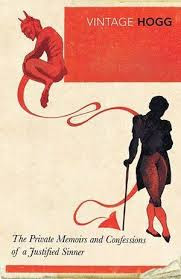
The first appeal of this book is that the author was an eighteenth century shepherd who taught himself to read. It’s not so often that the illiterate get a look in. It’s a strange story, full of unreliable narrators, including the author himself, who appears as a shepherd in the story.
It’s a thriller whose thrill is based on the Calvinist theory of predestination. Yes, you read that right. Apparently predestination was a hot topic in the eighteenth century. It’s the idea that as the saved are a chosen people, and as God has planned your life in advance, if you are one of the chosen you are always chosen, no matter what you do: you can’t sin yourself out of your pre-determined salvation, even by sinning a lot. This makes a sort of sense, if you think about it a lot, and shows the dangers of thinking a lot on anything. Logic has a lot of dead ends.
Predestination was I guess a kind of a cultural madness, and Hogg attempts to show this by taking it to its furthest extreme. A young man who believes himself saved is approached by another young man (‘Gil Martin’) and encouraged to think that it is his duty to smite the unbelievers. He’s hesitant, but is eventually convinced that even if he is in the wrong, he is saved in any case, so any error cannot keep him from heaven. He starts by smiting a local parson with whom he disagrees on some microscopic points of doctrine, and it goes downhill from there. It’s obvious to the reader from the beginning that Gil Martin is probably Satan, and over time it becomes horribly obvious to the young man also, who is driven to ever more desperate measures.
It made me think about the young men who join Daesh. It must take real courage to do what you think is right, and more courage to realise you were wrong, and an even more terrible courage to do anything about it.
